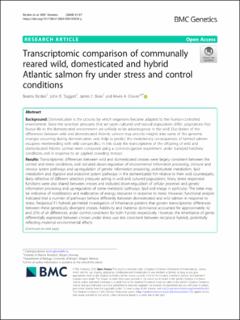| dc.contributor.author | Bicskei, Beatrix | |
| dc.contributor.author | Taggart, John B. | |
| dc.contributor.author | Bron, James E. | |
| dc.contributor.author | Glover, Kevin | |
| dc.date.accessioned | 2021-02-25T08:51:25Z | |
| dc.date.available | 2021-02-25T08:51:25Z | |
| dc.date.created | 2020-08-03T13:21:42Z | |
| dc.date.issued | 2020 | |
| dc.Published | BMC Genetics. 2020, 21:57 1-20. | |
| dc.identifier.issn | 1471-2156 | |
| dc.identifier.uri | https://hdl.handle.net/11250/2730266 | |
| dc.description.abstract | Background
Domestication is the process by which organisms become adapted to the human-controlled environment. Since the selection pressures that act upon cultured and natural populations differ, adaptations that favour life in the domesticated environment are unlikely to be advantageous in the wild. Elucidation of the differences between wild and domesticated Atlantic salmon may provide insights into some of the genomic changes occurring during domestication, and, help to predict the evolutionary consequences of farmed salmon escapees interbreeding with wild conspecifics. In this study the transcriptome of the offspring of wild and domesticated Atlantic salmon were compared using a common-garden experiment under standard hatchery conditions and in response to an applied crowding stressor.
Results
Transcriptomic differences between wild and domesticated crosses were largely consistent between the control and stress conditions, and included down-regulation of environmental information processing, immune and nervous system pathways and up-regulation of genetic information processing, carbohydrate metabolism, lipid metabolism and digestive and endocrine system pathways in the domesticated fish relative to their wild counterparts, likely reflective of different selection pressures acting in wild and cultured populations. Many stress responsive functions were also shared between crosses and included down-regulation of cellular processes and genetic information processing and up-regulation of some metabolic pathways, lipid and energy in particular. The latter may be indicative of mobilization and reallocation of energy resources in response to stress. However, functional analysis indicated that a number of pathways behave differently between domesticated and wild salmon in response to stress. Reciprocal F1 hybrids permitted investigation of inheritance patterns that govern transcriptomic differences between these genetically divergent crosses. Additivity and maternal dominance accounted for approximately 42 and 25% of all differences under control conditions for both hybrids respectively. However, the inheritance of genes differentially expressed between crosses under stress was less consistent between reciprocal hybrids, potentially reflecting maternal environmental effects.
Conclusion
We conclude that there are transcriptomic differences between the domesticated and wild salmon strains studied here, reflecting the different selection pressures operating on them. Our results indicate that stress may affect certain biological functions differently in wild, domesticated and hybrid crosses and these should be further investigated. | en_US |
| dc.language.iso | eng | en_US |
| dc.publisher | BMC | en_US |
| dc.rights | Navngivelse 4.0 Internasjonal | * |
| dc.rights.uri | http://creativecommons.org/licenses/by/4.0/deed.no | * |
| dc.title | Transcriptomic comparison of communally reared wild, domesticated and hybrid Atlantic salmon fry under stress and control conditions | en_US |
| dc.type | Journal article | en_US |
| dc.type | Peer reviewed | en_US |
| dc.description.version | publishedVersion | en_US |
| dc.rights.holder | Copyright The Author(s). 2020 | en_US |
| dc.source.articlenumber | 57 | en_US |
| cristin.ispublished | true | |
| cristin.fulltext | original | |
| cristin.qualitycode | 1 | |
| dc.identifier.doi | 10.1186/s12863-020-00858-y | |
| dc.identifier.cristin | 1821336 | |
| dc.source.journal | BMC Genetics | en_US |
| dc.source.40 | 21:57 | |
| dc.identifier.citation | BMC Genetics. 2020, 21, 57. | en_US |
| dc.source.volume | 21 | en_US |

